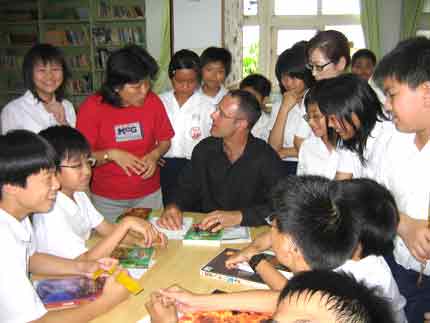|
Cartoons of
Dan McConnell
featuring
Tiny the Worm
Cartoons of
David Logan
The People's Comic
Cartoons of
John Jonik
Inking Truth to Power
|
Support the WA Free Press. Community journalism needs your readership and support. Please subscribe and/or donate.
posted Oct. 16, 2009

Costello, center, on a visit to a Taiwanese school.
Why Don’t Taiwanese Boys Like To Read?
By Bill Costello
The percent of
college enrollees who are male has declined dramatically in recent decades
in the US. Bill Costello has found that the decline in education of
boys—compared to that of girls—is a problem in other countries as
well. He’s been traveling the world in an attempt to find out why,
and to learn about good educational practices in other countries. –Ed.
While Taiwanese students earn scores among the highest in the world in science and math, they do not perform as well in reading.
Taiwanese fourth graders only scored slightly above average in reading performance on the most recent Progress in International Reading Literacy Study (PIRLS). Taiwanese 15-year-olds only scored average in reading performance on the most recent Program for International Student Assessment (PISA).
A major problem facing Taiwan is that boys there do not perform nearly as well as girls in reading. As an educational researcher, I have been trying to understand why.
Recently I was invited to observe classes at two public elementary schools in Taiwan: Dan Fong Elementary School located in Taipei City and Affiliated Experimental Elementary School of Taipei Municipal University of Education (ESTMUE) located in Taipei County.
As I observed Taiwanese students learning language arts, it became clear to me that girls enjoy reading more than boys. The girls participated more in class discussions about the books they were reading. When asked, the girls more often indicated that reading is a pleasurable activity.
Research shows that students who view reading as a pleasurable activity tend to read more frequently. Research also shows that reading more frequently is one of the best ways to improve reading skills.
It’s not surprising, then, that the average reading score for Taiwanese fourth graders on the most recent PIRLS was 13 points higher for girls and the average reading score for Taiwanese 15-year-olds on the most recent PISA was 21 points higher for girls.
The research is clear: greater reading skills equates to greater success in school. If something isn’t done to improve boys’ reading skills in Taiwan, then fewer and fewer boys will continue on to higher education.
Ever since 1998, more Taiwanese women have been enrolled in higher education than men. The proportion of educated women has increased each year while the proportion of educated men has decreased.
As jobs that require little education have increasingly diminished, more and more men have become unemployed. Ever since 1996, male unemployment rates in Taiwan have been significantly higher than those of females. This unemployment rate gender gap has widened over the years and is partially responsible for Taiwan’s unemployment rate hitting a record high this year.
Taiwanese boys lag behind girls in reading partly because most of their teachers have not been trained to recognize how the learning style of boys differs from the learning style of girls.
For example, boys learn better when teachers use more competition, physical activity, and hands-on learning in the classroom. And boys are more likely to enjoy reading nonfiction, stories with action and adventure, and stories with male protagonists.
In some countries—like America—new training programs and teacher education programs are beginning to train teachers to understand these learning differences between boys and girls. Newly trained teachers are improving boys’ reading skills without disadvantaging girls.
Taiwan can improve
boy’s reading performance by training teachers to recognize how the
learning style of boys differs from the learning style of girls.
Bill Costello, training director of Making Minds Matter, teaches parents and teachers the best strategies for educating boys. He can be reached at www.makingmindsmatter.com or trainer@makingmindsmatter.com.


